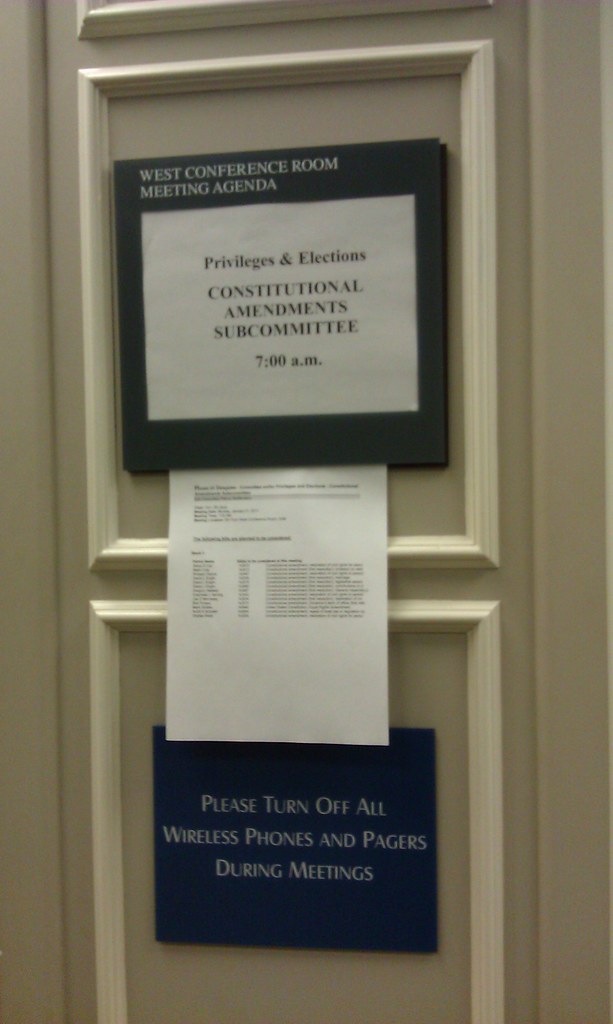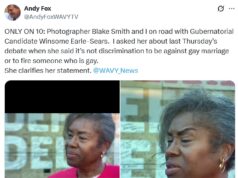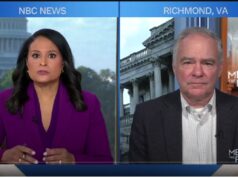( – promoted by lowkell)

In a packed, standing-room-only hearing room yesterday, a group of similar bills that would have amended the Virginia Constitution to allow the General Assembly to lay out a process for restoration of rights for people convicted of felonies, were defeated again in the House Privileges and Elections Subcommittee.
I will start with a summary and you can read more, including some of the Delegates’ off-the-wall comments, below the fold.
The short version of what happened today is that there was a long discussion about the bills, on matters such as how the amendments would be carried out and whether they would apply to gun rights, followed by a long line of citizens testifying in favor of restoration (and none against).
All the bills were rolled into one – Delegate Rosalyn Dance‘s HJ 497 – which would apply to those convicted of nonviolent felonies. Chairman Bill Janis decided that due to the extent of the discussion and the number of people who had arrived at 7am in support of the legislation, he would allow the bill to go up for a vote. The bill was defeated 5-1, with only Del. Lionel Spruill voting in favor of it.
Read below to see which Delegate thinks that Jim Crow had nothing to do with felon disenfranchisement, and more…
Photo credit: Del. Scott Surovell
The main differences between the series of bills were that some would apply to all ex-felons and others to only nonviolent ex-offenders, and that Delegate Charniele Herring‘s bill HJ 543 would also restore gun rights to nonviolent ex-offenders. Chairman Janis decided that the committee would hear the bills in numerical order, so Del. Rosalyn Dance’s HJ 497 was up first. Dance amended her bill to apply to only nonviolent ex-offenders. Some of the questions from committee members related to who would carry out the process, whether or not the bill would apply to gun rights, whether the Constitution already provided for the General Assembly to do this without an amendment, and other technical matters. The remaining Delegates made the case for their bills: Onzlee Ware (HJ 524), Herring (HJ 543), Betsy Carr (HJ 610) and Joe Morrissey (HJ 634).

My impression was that the committee was truly interested in hearing all aspects of the issue, but that some of them were uninformed of the facts relating to restoration of rights. I say this because there were some questions asked that wouldn’t have been necessary if they’d had the information on hand. Despite this, the committee endeavored to come to an understanding, particularly of the differences between the pieces of legislation before them.
Since each bill would give the General Assembly the ability to restore rights while allowing the governor to retain such powers, Chairman Janis wondered if an applicant turned down by one party could apply to the other. This reminded me of the child’s tactic, “if mommy says no, go ask daddy.” This issue would have to be ironed out if the legislation made it around to the next House of Delegates (as required for constitutional amendments). Another question posed by Janis was, which agency would carry out the process of restoration? Someone suggested that the Department of Corrections would be in charge of this.
Del. Lacey Putney, suffering from a cold and having nearly lost his voice, nonetheless appeared totally unaware that the Governor was the only person currently authorized to restore rights. You’d think he would have read the pertinent part of the Constitution before coming to the hearing.
Del. Ware thanked the Chairman for giving his bill a hearing because it was not even allowed one last year or the year before. He also made sure to “give credit where credit is due” in commending Governor McDonnell for “doing a fine job” with the restoration of rights process. Del. Bell asked an unnecessary question about a minor difference between Ware’s and Dance’s bills. Dance’s stipulated that rights would be restored when the person had completed their sentence, whereas Ware’s included the sentence, probation, parole, and any suspended sentence. What I would have spoken up and told them (if this were a less formal process) is that probation/parole – as well as fines and restitution – are also part of the sentence. Nonetheless, Janis eventually inserted a totally unnecessary amendment adding these specifics.
Del. Herring’s bill was the subject of a lot of discussion because, as I mentioned earlier, it included gun rights. Herring’s argument was that if we wanted to be consistent and honest with ourselves, then restoration should include all rights. Herring mentioned that she was also a member of the working group put together by Gov. McDonnell when they reformed the policy for restoration last year. Janis asked the secretary or clerk, Mary, why the definition of civil rights did not include Second Amendment rights. She replied that in the language, they were separate and that it was unclear whether there was a federal statute that might get in the way of restoring gun rights. Del. Spruill was strongly “not for the gun part” of Herring’s resolution. Delegate Jackson Miller took an interest. As a former police officer, he said, he had taken an informal poll of his friends and associates who had lost their rights due to a felony conviction. He asserted that “all but one” would prefer to have their gun rights restored than to have their voting rights back – and he had polled “several dozen” people. Spruill stated his belief that the gun language in the bill would ensure its defeat in the full committee or the full House, and Miller countered that he thought that would actually garner more votes.
Miller said that he would be “more inclined” to vote for restoration if it included gun rights, and there seemed to be some hope that he might work with Herring in the future. If there is to be bipartisan sponsored legislation, this may be the only route in the near future. It’s unfortunate that Herring’s bill didn’t come up for a separate vote; it would be interesting to see if it would fare better. It would have lost Spruill’s vote, but might’ve picked up Miller’s and perhaps others. I don’t know how the bill would do in the rest of the legislature, but this reminds me of a common quote from Sen. Dick Saslaw regarding gun laws, which I’ll paraphrase: “If there were legislation in the house requiring every household to have a missile launcher in their backyard, it would still sail through the General Assembly.”
Del. Morrisey spoke passionately in support of HJ 634. There was some discussion on whether or not the General Assembly already had the authority to provide for restoration of rights. You see, the Virginia Constitution gives this power to the “Governor or other appropriate authority.” Morrisey believed that the appropriate authority also applied to the GA, not just the Governor and the President of the United States in issuing pardons. However, there had been a past Attorney General’s opinion (nobody could remember whom) that this was not the case. Morrisey said that this is about restoring dignity. He recounted the story of a 70 year old man that he met, who was fired from his job as a Wal-Mart greeter because of a felony on his record from 50 years ago. In response to Miller’s informal poll that people are less interested in getting their voting rights restored, Morrissey said that most people he talks to “don’t have a burning desire to become a notary,” to serve on a jury or even to buy a gun. They want to be part of the political process.
A large group of citizens lined up to testify in favor of the restoration of rights bills. Forgive me if I leave someone out. They included:
A gentleman who is a nonviolent ex-offender like myself. The first person to speak has experienced many hardships in being denied housing and employment because of his record. I have to mention at this point something I have been keenly aware of since the year I was released from prison. If I were not white, I would have probably faced the same hardships as this gentleman who testified but instead, I’ve had no problems finding jobs despite having to admit to my past. It’s all because of the way that the entire system tends to create the stereotype of the ex-felon and to disproportionately affect African-Americans – from arrests, to convictions, to sentencing, and on to life after judgment.
Anne Sterling, Legislative Coordinator of the Virginia League of Women Voters, in support generally of restoration, and when asked did not have an opinion on the gun issue. Sterling pointed out that LWV-VA President Olga Hernandez was also in attendance, underscoring the importance of this issue to their organization.
Philip Van Cleave, President of the Virginia Citizens’ Defense League, supported restoration of rights along with gun rights.
Hope Amezquita, Legislative Counsel of the Virginia ACLU. Of course, she was attacked by several of the Delegates – proving one of my friend’s opinions that due to the makeup of the committee, the ACLU’s support may actually hurt the bills’ chances of passage. Janis asked how the ACLU could “pick and choose” which parts of the US Constitution they wanted to advocate for (contending that they didn’t support the Second Amendment). Amezquita made the distinction that the Virginia ACLU has a slightly different mission than the national organization. After she mentioned the history of felon disenfranchisement, which is firmly rooted in the Jim Crow era of laws passed with the expressed purpose of eliminating the black vote, Delegate Mark Cole could no longer contain himself.
“I’m sick of this Jim Crow stuff!” Cole rejected the idea that disenfranchisement had anything to do with racism, because a more recent Constitution was approved in 1971 (as opposed to the previous 1902 version). According to Cole, proponents of restoration of rights bring up Jim Crow because when they run out of arguments, their last resort is to “play the race card.”
Amezquita respectfully disagreed, repeating that detailed records of the constitutional convention show the clear intent of disenfranchising African-Americans. I’ll post the quote that she and others in the room were thinking of:
Discrimination! Why that is precisely what we propose. That, exactly is what this Convention was elected for – to discriminate to the
very extremity of permissible action under the limits of the Federal Constitution, with a view to the elimination of every Negro voter who can be
gotten rid of legally, without materially impairing the numerical strength of the white electorate.
-State Sen. Carter Glass, 1902

The fact that felon disenfranchisement was around before African-Americans could vote, and that it survived into the current Constitution, does not justify it. It also doesn’t change the fact that at the turn of the last century, it became one of the tools commonly used by states for the specific purpose of eliminating African-Americans from the voter rolls. We can see the effects of this all the way up to the year 2000, when many African-Americans were purged from the voter rolls before election day because they had the same or similar names to people who had felony convictions. Then-Republican Governor Charlie Crist saw the injustice in this and later issued an executive order instituting automatic restoration of rights (something we were trying to convince Tim Kaine to do in 2009).
Ben Greenberg from Virginia Organizing lent his support of the bills.
I had a chance to speak about my experience having my application denied by Tim Kaine for having traffic tickets, and subsequently being approved, thankfully, by Govenor McDonnell. The ease with which the policy can be changed is itself an argument for enacting a law that would make it more consistent and fair. In answer to the Delegates’ questions on whether or not gun rights could be restored, I read from the letter I received from the Secretary of the Commonwealth:
Governor McDonnell’s action on your behalf removes all political disabilities… except the right to ship, transport, possess or receive firearms, which must be restored in accordance with Va. Code 18.2-308.2.
That section of the code requires that ex-offenders must first have their rights restored, and then petition the court, in order to be granted gun rights.
Linwood Christian, an ex-offender who had applied before Governor McDonnell took office, and who then had received one of those infamous (and later rescinded) notices from the Sec. of the Commonwealth requiring him to write an essay describing why he thought his rights should be restored.
A pastor from an interfaith ministry organization (whose name escapes me). Del. Bell asked the pastor a theological question something like this: Doesn’t God forgive people on an individual basis? What Bell was apparently trying to get at was a justification for retaining the god-like power of the Governor to grant restorations. The pastor responded that he would love to have that discussion with Bell, but that they may be the only two people in the room interested in hearing it.
The Presidents of the NAACP chapters in Petersburg and Hanover spoke in support of restoration for non-violent ex-offenders.
Finally, a young man who was also an ex-offender who had lost his rights. He pointed out that many of his friends in the same situation had grown suspicious of or hostile to the government because of their exiled status. He pointed to the tragedy in Tuscon and suggested that the current policy of permanent disenfranchisement may only serve to further isolate and alienate people with mental disabilities.
Following the testimonies, Chairman Janis rolled all the bills into the one HJ 497. A vote was held and the bill was defeated 5 to 1. It is important to note that not one single person gave a justification for continuing felon disenfranchisement. Neither any Delegate, nor any witness, even suggested that the current Constitutional provision was good or even preferable to any alternative. The only misgivings that any Delegates had were the absence of the restoration of gun rights, and other technical issues. Putney was opposed because he thought the Constitution already provided for the General Assembly to restore rights. Janis concluded that the “diversity of opinion” on the details of the bill was the “best argument for not putting this in the Constitution.” I doubt that this was the reason for defeating the same legislation last year.
I have tried to represent the course of events as accurately as I can recall. Feel free to notify me if you think anything was omitted or appears inaccurate.













